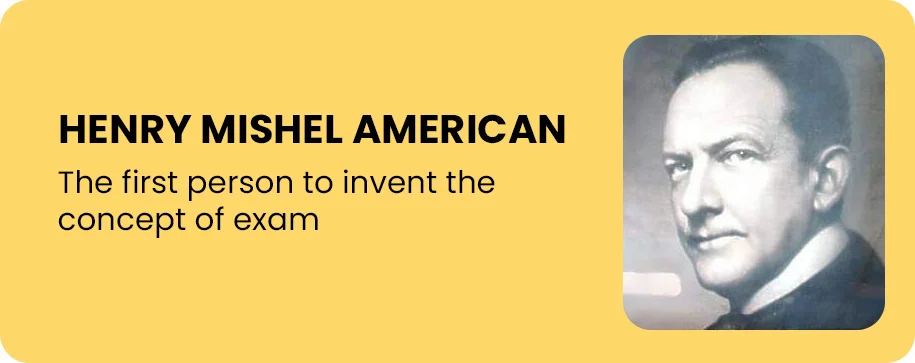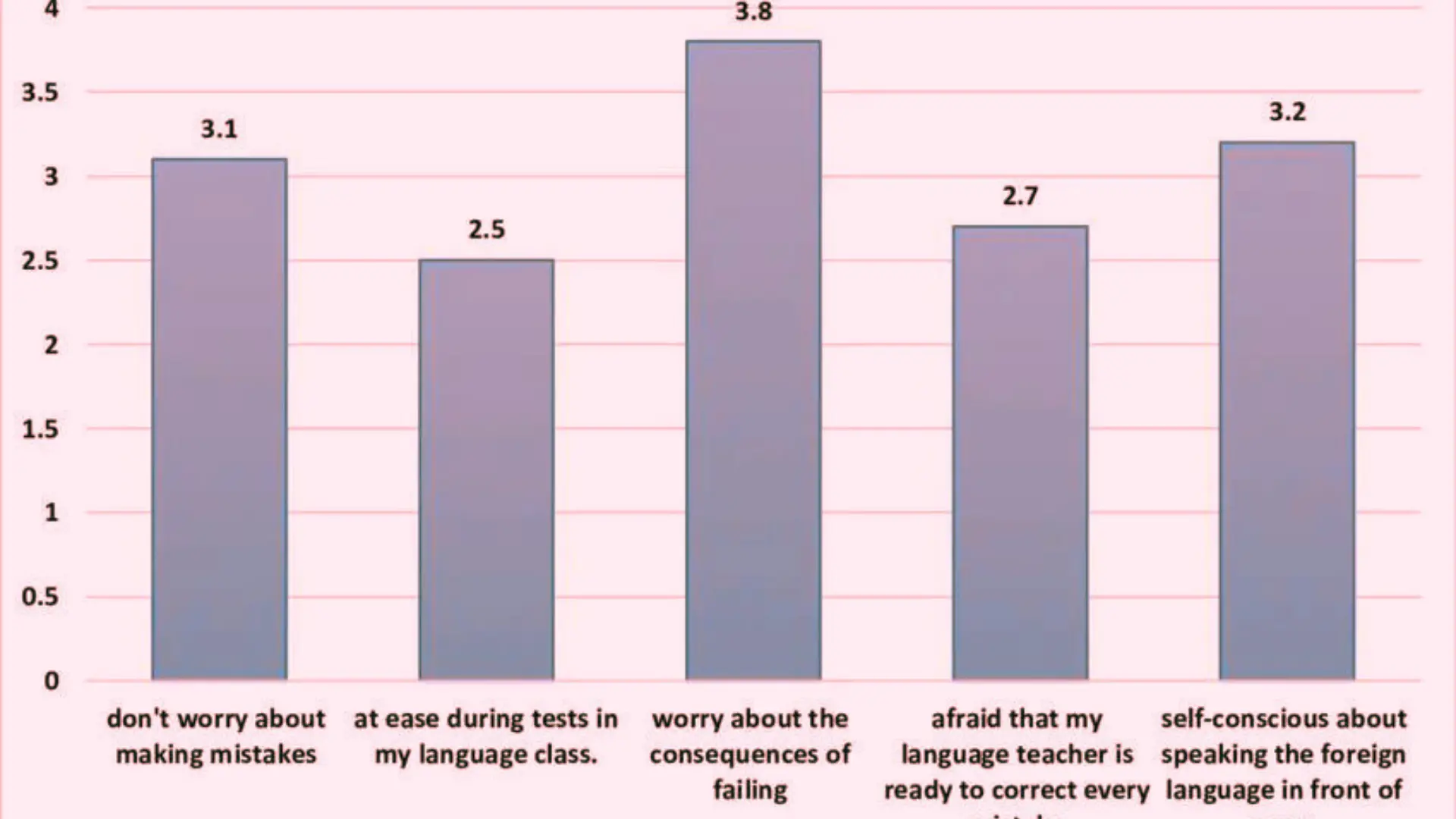
Update: This article was last updated on 7th Aug 2024 to reflect the accuracy and up-to-date information on the page.
If we seek answers to who invented exams, then the concept of exams was created in the late 19th century by an American businessman named Henry Fischel.
Ah, exam day—that horrible day. The day when most of us simultaneously felt like puking up our breakfast, lunch, and dinner. If things do not go as planned, disappointment can hit like a tonne of bricks.
Sometimes we wonder who invented school tests and why. Exam anxiety is common, mainly if you are under pressure from your family or school. You are not alone if you experience any of these emotions or worry that your life is being consumed by exam stress.
“What success looks like is a lot of ups and downs, as opposed to the straight line we all imagine. Without failure, we cannot grow; without failure, there is no success.”
The History of Exams
Your inquisitive mind must now seek brief tidbits on the “history of exams” and how they changed. When did things get so difficult to understand? Well, we also have an answer for that.

Recommended blog: Is Advanced Calculus The Hardest Math Class In High School? A Student’s Perspective
In this blog, we will provide the necessary information for those still wondering who invented exams. According to historical evidence, the idea of exams originated in Ancient China. In fact, China was the first nation to accept the idea of tests and held the first exam ever.
The Imperial Examination was the name of China’s first test.
To choose applicants for specific government jobs, the Sui Dynasty established the Imperial Examination System, often called the “Imperial Review,” in 605 AD.
The Chinese Imperial Examination system, which began in the Han Dynasty, was a highly competitive examination system that tested candidates’ knowledge of Confucian texts and their ability to write poetry and prose.
The system was used to select candidates for government positions and was in place for over 1,300 years.
Following Sui, England implemented the testing method in 1806. The test was designed to evaluate candidates for Her Majesty’s Civil Service positions.
In the late 19th century, a standard university test for Oxford and Cambridge was introduced. Male students seeking admission to schools were the original target audience for the Cambridge Assessment.
The first Cambridge Assessment took place on December 14, 1958, and the test covered subjects such as English, mathematics, Latin, history, French, German, and geography.
In Greece, reportedly, the philosopher Socrates used a form of an oral examination to test his students’ knowledge and understanding of philosophy.
During the Middle Ages, universities emerged in Europe, and examinations became more widespread. However, these exams were often oral and not standardized.
Recommended reading: How to Boost Your Child’s Math with Confidence: Book Recommendations
Who Invented Exams in India
The traditional Gurukul system, where pupils lived with their teachers and received oral instruction, was the cornerstone of the old Indian educational system. Later, as the system developed, tests were added to gauge pupils’ knowledge.
The modern exam system was first launched in India in 1853. Previously, the East India Company directors appointed government servants based on nominations. The English Parliament ended the nomination process in 1853 and after that candidates for government jobs were selected through competitive exams held annually in London.
Exams grew more widely and were used for various objectives throughout the 20th century, such as college admissions, professional licensing, and employment screening.
Exams are crucial to today’s educational system since they measure students’ knowledge, skills, and talents. They are also used for certification, licensing, job screening, etc.
Exams, which have a long and fascinating history, are still changing as technology and educational methods advance.
Recommended blog: Is Advanced Calculus The Hardest Math Class In High School? A Student’s Perspective
Here is some food for thought:
How would you rate the performance of pupils if you had the authority to alter the educational system?
Do you know that in the earlier days of the oral test, pupils had to respond to questions while holding an egg aloft?
In all seriousness, looking into fresh and inventive approaches to gauge pupils’ knowledge and skills is always a good idea. Who knows, we will devise a method that works well for everyone.
Recommended reading: Boosting Math Proficiency: Using AI Labs and Robots to Make Learning Fun
Conclusion
Exams have changed because of different cultural and educational practices worldwide. They were developed to assess knowledge and abilities in many societies and educational systems rather than being invented by a single person.
We hope this article has covered the brief history of who invented exams, enhanced your knowledge, and inspired you to share it with your friends and classmates. Who knows, maybe these facts will pique their interest and help them appreciate the importance of tests.
Moonpreneur is on a mission to disrupt traditional education and future-proof the next generation with holistic learning solutions. Its Innovator Program is building tomorrow’s workforce by training students in AI/ML, Robotics, Coding, IoT, and Apps, enabling entrepreneurship through experiential learning.
FAQs: Exam History and Educational System
Ans: In 605 AD, the Imperial Examination System introduced the notion of exams to Ancient China. However, an American businessman named Henry Fischel developed and structured exams for specialized objectives in the late 19th century.
Ans: Exams started in Ancient China and were later used for civil service positions in England. They gradually expanded to include universities, standardized entrance examinations, and employment screenings.
Ans: Exams are used to assess students’ knowledge, skills, and talents and are used for certification, licensure, employment screening, and college admissions.
Ans: Exams continue to evolve in tandem with technology advancements, adjusting to new educational practices around the world
Ans: Investigating creative techniques outside standard tests could help properly assess students’ knowledge and abilities while catering to varied learning styles.
Ans: Moonpreneur offers online STEM programs focused on robotics, game development, app development, advanced math, etc., aiming to educate and foster entrepreneurship among kids in the evolving technological landscape.
Ans: Interested individuals can register for a free 60-minute Robotics and Coding class through Moonpreneur’s platform.
Ans: Learning about the history of exams allows us to appreciate their significance in education, showcasing how assessment methods have evolved over time.
Ans: In earlier oral tests, pupils had to respond to questions while holding an egg aloft, adding a challenging physical component to the assessment.


























How have exams changed over time?
Exams have changed significantly over time. In the early days of exams, they were mostly written exams that focused on rote memorization. However, today’s exams are more likely to be multiple choice exams or performance-based exams that assess students’ critical thinking skills and problem-solving abilities.
Are exams still necessary in today’s world?
Whether or not exams are still necessary in today’s world is a matter of debate. Some people believe that exams are an outdated way to assess student learning and that there are better ways to measure student progress. Others believe that exams are still a valuable tool for assessing student learning and that they should continue to be used.